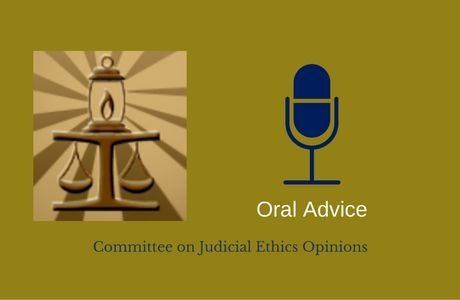Committee Issues Advice About Reimbursement of Judicial Expenses by a Party or Counsel
A state Supreme Court committee today posted a summary of oral advice given to a judge who asked whether it is ethically proper to accept reimbursement from parties or their attorneys for travel expenses incurred during official duties. Judges can incur such expenses when parties in complex multi-jurisdiction litigation ask the judge to attend or participate in parallel proceedings outside the judge’s county.
In a summary of the advice posted on the committee's website, the Supreme Court Committee on Judicial Ethics Opinions (CJEO) concludes reimbursement of a judge’s travel, lodging and meals would constitute a gift to the judge, which is prohibited if the source of the payment is a party.

“The committee wanted to remind judges that the prohibition on gifts from a party is absolute, whether the gift is given by the party directly or through its counsel, and regardless of whether the gift is made for the benefit or convenience of the party or its counsel,” said Justice Douglas Miller, vice-chair of the committee.
Although a judge’s travel expenses may not be reimbursed by the parties or their attorneys, reimbursement may be possible pursuant to appropriate policies and procedures which the Legislature tasked the Judicial Council with developing that ensure fiscal responsibility and provide for appropriate accountability. By following such procedures, judges can avoid ethical issues such as the appearance of bias or financial disclosure obligations that would arise if they were to receive payment from parties. The committee concludes that the policies, procedures and reimbursement rates approved by the Judicial Council are mandatory and the sole means for seeking payment of expenses that a judge incurs in connection with official judicial duties.
“We believe advice about the mandatory court reimbursement rules provides practical guidance for when a judge travels as part of a case,” said Justice Miller.
About the Committee on Judicial Ethics Opinions (CJEO)
The Committee on Judicial Ethics Opinions is a 12-member advisory committee that includes appellate justices, trial court judges and commissioners. The committee is appointed and authorized by the California Supreme Court, but its work is independent of the court, the Judicial Council, and all other entities. Its opinions are advisory and do not necessarily reflect the views of the California Supreme Court or any other entity.
The committee issues formal opinions, informal opinions, and oral advice on proper judicial conduct pursuant to the California Code of Judicial Ethics and other authorities. CJEO summarizes its oral advice and posts the summaries on the CJEO website for the benefit of the bench and the public.
Read frequently asked questions about the committee here.


